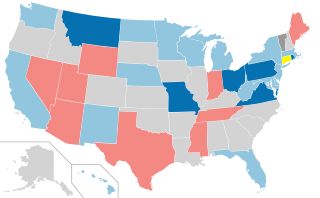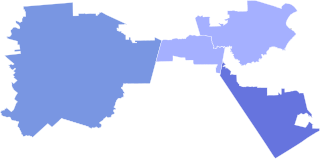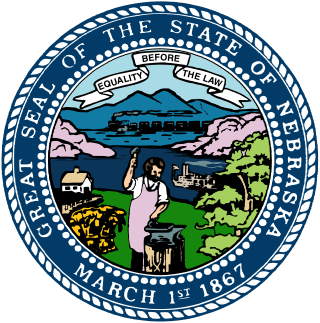Related Research Articles

In the United States, the Electoral College is the group of presidential electors that is formed every four years for the sole purpose of voting for the president and vice president. The process is described in Article II of the U.S. Constitution. Each state appoints electors using legal procedures determined by its legislature, equal in number to its congressional delegation totaling 535 electors. A 1961 amendment granted the federal District of Columbia three electors. Of the current 538 electors, a simple majority of 270 or more electoral votes is required to elect the president and vice president. If no candidate achieves a majority there, a contingent election is held by the House of Representatives to elect the president and by the Senate to elect the vice president. Federal office holders, including senators and representatives, cannot be electors.
Primary elections, or direct primary, are voting processes by which voters can indicate their preference for their party's candidate, or a candidate in general, in an upcoming general election, local election, or by-election. Depending on the country and administrative divisions within the country, voters might consist of the general public in what is called an open primary, or solely the members of a political party in what is called a closed primary. In addition to these, there are other variants on primaries that are used by many countries holding elections throughout the world.
Ballot access are rules and procedures regulating the right to candidacy, the conditions under which a candidate, political party, or ballot measure is entitled to appear on voters' ballots in elections in the United States. The jurisprudence of the right to candidacy and right to create a political party are less clear than voting rights in the United States. However, the U.S. Supreme Court has established in multiple cases that the federal constitution does not recognize a fundamental right to candidacy, and that state governments have a legitimate government interest in blocking "frivolous or fraudulent candidacies". As election processes are decentralized by Article I, Section 4, of the United States Constitution, ballot access laws are established and enforced by the states. As a result, ballot access processes may vary from one state to another. State access requirements for candidates generally pertain to personal qualities of a candidate, such as: minimum age, residency, and citizenship. Additionally, many states require prospective candidates to collect a specified number of qualified voters' signatures on petitions of support and mandate the payment of filing fees before granting access; ballot measures are similarly regulated. Each state also regulates how political parties qualify for automatic ballot access, and how those minor parties that do not can. Fundamental to democracy, topics related to ballot access are the subject of considerable debate in the United States.

The 2008 United States presidential election was the 56th quadrennial presidential election, held on November 4, 2008. The Democratic ticket of Barack Obama, the junior senator from Illinois, and Joe Biden, the senior senator from Delaware, defeated the Republican ticket of John McCain, the senior senator from Arizona, and Sarah Palin, the governor of Alaska. Obama became the first African American to be elected to the presidency, as well as being only the third sitting United States senator elected president, joining Warren G. Harding and John F. Kennedy. Meanwhile, this was only the second successful all-senator ticket since the 1960 election and is the only election where both major party nominees were sitting senators. This was the first election since 1952 in which neither the incumbent president nor vice president was on the ballot, as well as the first election since 1928 in which neither ran for the nomination.

Elections in Georgia are held to fill various state and federal seats. Regular elections are held every even year. The positions being decided each year varies, as the terms of office varies. The State Senate, State House and U.S. House will typically be up for election, as all of those positions have two-year terms. Special elections are held to fill vacated offices. Georgia is one of seven states that require a run-off election if no candidate receives a majority of the vote in a primary election. Uniquely, Georgia requires a run-off election for state and congressional offices if no candidate wins a majority of the vote in a general election; only Louisiana has a similar requirement, but it operates under a different election system.

The 2006 United States Senate elections were held on November 7, 2006, with all 33 Class 1 Senate seats being contested. The term of office for those elected in 2006 ran from January 3, 2007, to January 3, 2013. Prior to the election cycle, the Republican Party controlled 55 of the 100 Senate seats.

United States gubernatorial elections were held on November 7, 2006, in 36 states and two territories. The elections coincided with the midterm elections of the United States Senate and the United States House of Representatives.

A special election was held in California's 50th congressional district to choose a new member of the U.S. Representative to fill the vacancy caused by the resignation of Republican Randy Cunningham, who resigned November 28, 2005 after pleading guilty to bribery, wire fraud, mail fraud, and tax evasion charges..

The 2006 Texas 22nd congressional district election for the 110th Congress was held on November 7, 2006, and attracted considerable attention because this district was represented by former House Majority Leader Tom DeLay, a prominent member of the Republican Party, who resigned after being indicted and subsequently winning the Republican primary. Because of Texas state law, Republicans, in order to hold on to the seat, would have had to win a write-in campaign, something that has only been done four other times in the history of U.S. congressional elections.
Louisiana primary is the common term for top-two runoff voting system where all candidates for the same office appear together on the ballot in the general election, and if none win a simple majority, a runoff or second round election for the two top candidates is held a short time later to determine the winner.

The 2010 Maryland gubernatorial election was held on November 2, 2010. The date included the election of the governor, lieutenant governor, and all members of the Maryland General Assembly. Incumbent Democratic governor Martin O'Malley and lieutenant governor Anthony Brown won re-election to a second term in office, defeating Republican former governor Bob Ehrlich and his running mate Mary Kane.

Elections in Vermont are authorized under Chapter II of the Vermont State Constitution, articles 43–49, which establishes elections for the state level officers, cabinet, and legislature. Articles 50–53 establish the election of county-level officers.

The 1992 United States Senate election in Georgia was held on November 3, 1992. In the general election, which occurred simultaneously with the presidential election, incumbent Democratic U.S. Senator Wyche Fowler received more votes, but did not achieve a simple majority. Under Georgia law, this demanded a runoff. Paul Coverdell, the former Director of the Peace Corps, edged out Fowler in the November 24 runoff by a narrow margin, flipping the seat to the Republicans. It was the first Senate runoff election to be held in Georgia since runoffs were first mandated in 1964. This was the third consecutive election for this Senate seat where the incumbent was defeated.

The election of the president and the vice president of the United States is an indirect election in which citizens of the United States who are registered to vote in one of the fifty U.S. states or in Washington, D.C., cast ballots not directly for those offices, but instead for members of the Electoral College. These electors then cast direct votes, known as electoral votes, for president, and for vice president. The candidate who receives an absolute majority of electoral votes is then elected to that office. If no candidate receives an absolute majority of the votes for president, the House of Representatives elects the president; likewise if no one receives an absolute majority of the votes for vice president, then the Senate elects the vice president.

The 2014 elections for the Pennsylvania State Senate were held on November 4, 2014, with all even-numbered districts being contested. Primary elections were held on May 20, 2014.

The 2020 United States Senate elections were held on November 3, 2020, with the 33 class 2 seats of the Senate contested in regular elections. Of these, 21 were held by Republicans, and 12 by Democrats. The winners were elected to 6-year terms from January 3, 2021, to January 3, 2027. Two special elections for seats held by Republicans were also held in conjunction with the general elections: one in Arizona, to fill the vacancy created by John McCain's death in 2018; and one in Georgia, following Johnny Isakson's resignation in 2019. These elections ran concurrently with the 2020 United States presidential election in which incumbent president Donald Trump lost to Democratic nominee Joe Biden.

The 2020 United States elections were held on Tuesday, November 3, 2020. The Democratic Party's nominee, former vice president Joe Biden, defeated incumbent Republican president Donald Trump in the presidential election. Despite losing seats in the House of Representatives, Democrats retained control of the House and gained control of the Senate. As a result, the Democrats obtained a government trifecta, the first time since the elections in 2008 that the party gained unified control of Congress and the presidency. With Trump losing his bid for re-election, he became the first defeated incumbent president to have overseen his party lose the presidency and control of both the House and the Senate since Herbert Hoover in 1932. This was the first time since 1980 that either chamber of Congress flipped partisan control in a presidential year, and the first time Democrats did so since 1948.

United States gubernatorial elections were held on November 8, 2022, in 36 states and three territories. As most governors serve four-year terms, the last regular gubernatorial elections for all but two of the seats took place in the 2018 U.S. gubernatorial elections. The gubernatorial elections took place concurrently with several other federal, state, and local elections, as part of the 2022 midterm elections.

The 2020 United States presidential election in Nebraska was held on Tuesday, November 3, 2020, as part of the 2020 United States presidential election in which all 50 states plus the District of Columbia participated. Nebraska voters chose electors to represent them in the Electoral College via a popular vote, pitting the Republican Party's nominee, incumbent President Donald Trump, and running mate Vice President Mike Pence against Democratic Party nominee, former Vice President Joe Biden, and his running mate California Senator Kamala Harris. Nebraska has five electoral votes in the Electoral College, two from the state at large, and one each from the three congressional districts.

The 1970 Idaho gubernatorial election took place on November 3 to elect the governor of Idaho, concurrently with other scheduled governor races, as well as Idaho's two congress members in the House of Representatives and a number of statewide offices. Incumbent Republican governor Don Samuelson sought re-election to a second consecutive term as governor. Although he faced a primary challenger, former state senator Dick Smith, he received more than 58 percent of the primary vote, and thus secured the party's re-nomination.
References
- ↑ November 2006 General (Report).
- ↑ September 2006 Primary (Report).